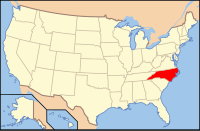Transylvania County, North Carolina
| Transylvania County, North Carolina | ||
|---|---|---|

Transylvania County Courthouse
|
||
|
||
 Location in the U.S. state of North Carolina |
||
 North Carolina's location in the U.S. |
||
| Founded | 1861 | |
| Named for | The Transylvania Company | |
| Seat | Brevard | |
| Largest city | Brevard | |
| Area | ||
| • Total | 381 sq mi (987 km2) | |
| • Land | 379 sq mi (982 km2) | |
| • Water | 2.0 sq mi (5 km2), 0.5% | |
| Population | ||
| • (2010) | 33,090 | |
| • Density | 87/sq mi (34/km²) | |
| Congressional district | 11th | |
| Time zone | Eastern: UTC-5/-4 | |
| Website | www |
|
Transylvania County is a county located in the U.S. state of North Carolina. As of the 2010 census, the population was 33,090. Its county seat is Brevard.
Transylvania County comprises the Brevard, NC Micropolitan Statistical Area, which is also included in the Asheville-Brevard, NC CSA combined statistical area.
Founded in 1861, the county's name is derived from the colonial Transylvania Company and has Latin origins: trans ("across") and silva ("woods").
Prior to the early twentieth century, an overwhelming majority of Transylvania County’s residents subsisted through agriculture, often growing basic staples such as potatoes and cabbage.
Beginning in the early twentieth century with Joseph Silverstein’s tannery, a manufacturing economy began to emerge in the county relying on timber and related products harvested from the Pisgah National Forest. In the 1930s, Harry Straus opened a paper mill in the Pisgah Forest area, and by the mid-20th century Straus' Ecusta Paper manufacturing site provided jobs to over 3,000 local residents. During the peak industrial years of the 1950s, DuPont located one of its factories in the county, employing nearly 1,000 more residents.
In the following decades, Brevard College and its namesake town each grew at an unprecedented rate, and Brevard Music Center and its summer Brevard Music Festival began to attract musicians and enthusiasts from around the country to Transylvania County.
Since the later part of the twentieth century, Transylvania County has experienced a change in its economic base as many of the manufacturing operations that once operated there, including Ecusta and DuPont, either went defunct or left the United States for more favorable business conditions abroad. Since that time, the county has worked to reshape its economy around the growing Appalachian summer and winter tourism industry.
...
Wikipedia

